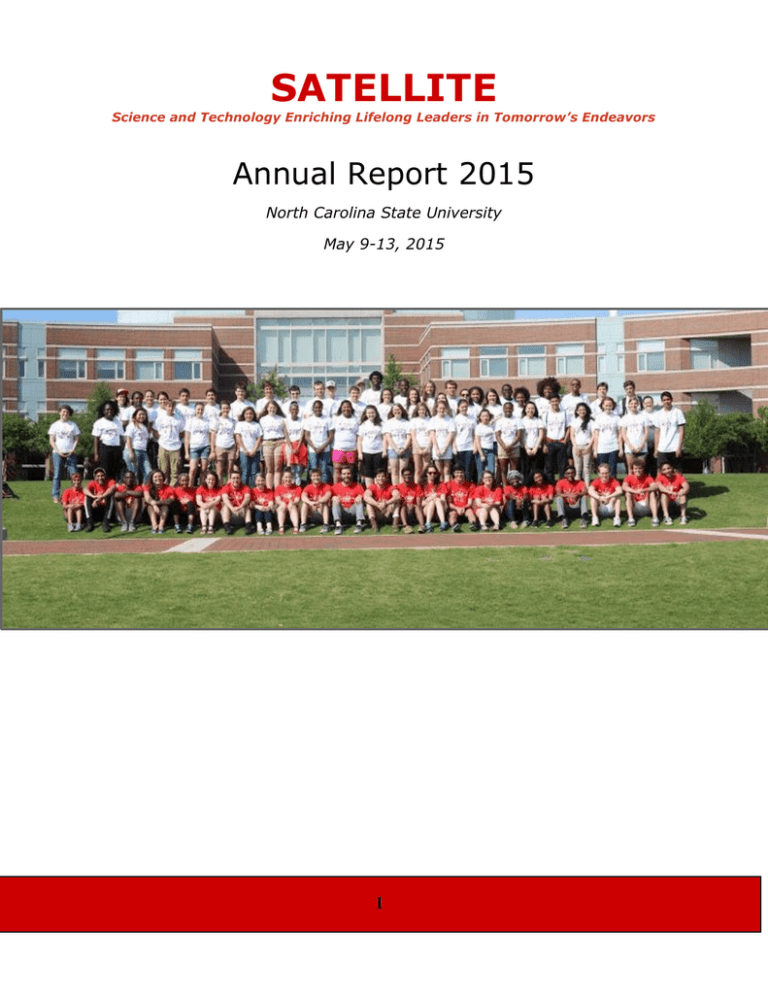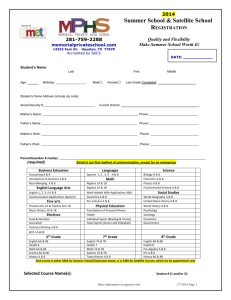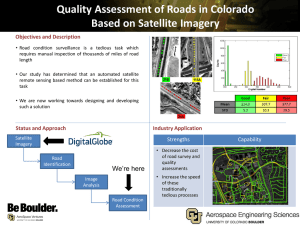Annual Report - NCSU Student Organizations
advertisement

SATELLITE Science and Technology Enriching Lifelong Leaders in Tomorrow’s Endeavors Annual Report 2015 North Carolina State University May 9-13, 2015 1 Report Contents From the Co-Directors 3 A special message from the incoming Co-Director 4 Mission 5 History 6 Improvements and Action Plan 7 Program Highlights 8 Impact 9 Finances 10 Budget 11 Volunteer Staff 12 Support 14 2 From the Co-Directors SATELLITE successfully completed its 19th year of camp this summer with 54 students and 23 counselors. We brought students to NC State all the way from the mountains of Henderson County to the Coast of Pender County. Exciting activities included an impressive nuclear reactor tour, a trip downtown to visit the NC Museum of Natural Science, an engaging science product invention project facilitated by the Shelton Leadership Center, and a challenging, teamwork oriented ropes course run by our counselors. We also increased our counselor to camper ratio and expanded subjects covered during the program. SATELLITE was new, but maintained the core elements that make it so impactful. We look forward to continued growth and keeping the program exciting for many years to come. On May 13th, Josiah Keilson completed his two-year commitment as co-director to SATELLITE. During his time, he served as both a counselor and co-director, growing the program to its largest capacity ever and putting an increased focus on measurement of impact and financial sustainability. Upon graduating with an Economics degree, he will be moving to Washington D.C. to work with Deloitte Consulting’s federal practice. Jacob Lineberry is the new senior co-director, and is studying Physics and Math. Over the summer, Jacob completed an over 500 mile hike across Spain knows as “El Camino de Santiago.” This will be his third year working with the program. Kevin Kauffman has been selected to serve as the new junior co-director. Both co-directors are excited about furthering the program’s financial sustainability and growing greater alumni and business relations as the program enters its 20th year. 3 From the 2016 incoming Co-Director My name is Kevin Kauffman and I have the honor of serving as the junior co-director for the SATELLITE program’s 20th year in 2016. I previously served with SATELLITE for the past two years as the Director of Scheduling and as a counselor. I first became involved with SATELLITE during my sophomore year of high school as a camper, and it altered the trajectory of my academic, professional, and personal life. SATELLITE is a high impact program for all who are involved and brings in some of the most talented and compassionate individuals on the campus of North Carolina State University, from our counselors to professors, with a mission to have impact in the lives of our campers. Attending SATELLITE was a key factor in my decisions to pursue a degree in mechanical engineering and take on leadership roles during my time at university. As a camper (yes- that’s me as a high school sophomore to the left!), I was amazed at the quality of individuals the SATELLITE program chose as counselors, some of whom I am still in contact with today. As the first program alum to become a co-director, I am now even more amazed by the potential I see in our students and the passion shown by our volunteers. I am excited to be able to serve our campers for the next two years and contribute to the growth and sustainability of SATELLITE. 4 Mission The mission of Science And Technology Enriching Lifelong Leadership In Tomorrow’s Endeavors is to provide students from underserved high schools in North Carolina with: Opportunities to explore and engage with current issues and career paths in the sciences and in technology-related disciplines through innovative lectures and hands-on laboratory experiences. Exposure to the university experience through on-campus housing accommodations, tours of university facilities, and seminars with current students and university staff. Personal development activities related to leadership, reflection, diversity, and cultural awareness. Motivation for continued educational pursuit and achievement in science and technology. 5 History In the spring of 1996, several students from North Carolina State University participated in an experimental outreach program designed for motivated high school sophomores from low-income public schools across the state. The success of that year’s program laid the foundation for what has become the SATELLITE program. SATELLITE (Science And Technology Enriching Lifelong Leadership In Tomorrow’s Endeavors) is a non-profit organization run by students from North Carolina State University. It is designed to introduce students from rural North Carolina high schools to science, technology, leadership, and related educational opportunities and career paths through a five-day retreat on the N. C. State campus. North Carolina public schools receive disproportionate funding. Rural school systems generally receive considerably less funding than their urban counterparts. For this reason, students from rural communities often are not provided with opportunities to develop to their full academic potential. These promising students need guidance and encouragement early in their high school careers to explore educational opportunities and career options. Many students who would otherwise pursue the areas of science and technology have limited exposure to those areas and fail to consider engaging in that line of inquiry. The NC State SATELLITE program was created to address the needs of these students by giving them exposure to resources, ideas, and opportunities that their schools may have been unable to provide. SATELLITE also emphasizes the importance of maintaining a broad, reflective, multidisciplinary outlook in the typically specialized fields of science and technology. 6 Improvements and Action Plan 2015 Improvements Improvements made during preparation for the May 2015 program included: Incorporating feedback and statistical findings from our program’s first ever round of pre and post-survey evaluations, which were conducted during the 2014 program. Restructuring our schedule to increase the time program participants spend actively reflecting, discussing, and writing about what they are learning during the program’s academic, leadership, and mentoring sessions. Working more closely with the Raleigh community to increase support, funding, and awareness of the program, in aims of building longer term sponsorships. Took tangible action steps toward beginning a program endowment. Increased the nutritional quality of meals served throughout the program. 2016 Action Plan Improvements to be made in preparation for the May 2016 program include: Creating a SATELLITE Board of Advisors composed of faculty, sponsors, RTP corporate leadership, and the current co-directors in order to continually improve the overall quality of SATELLITE. Developing more robust corporate and non-profit relationships with groups such as RTP’s US2020 and The Science House. Working with the board and University to create a reasonable timeline with reachable benchmarks for the endowment. Continue improvement of program evaluation and impact measurement. Recruiting more heavily on NC State’s campus to increase the diversity of our volunteer staff. 7 2015 Program Highlights Highlights of workshops attended by the 2015 scholars: Nuclear Reactor Tour - Students attended a Nuclear Reactor tour and lecture at NC State’s Nuclear Engineering Department. Students consistently cited this as among their favorite sessions of the whole program, saying it was interesting, exciting, and inspiring. Multi-Disciplinary Engineering – Students were given various materials correlated to different prices and qualities to simulate the engineering planning, design, budgeting, and creation process. They were instructed to find the most successful outcome, leading to a discussion of what merited success for a real world-engineering project. Paper and Pulp Science Manufacturing Lab – Students received a paper and pulp science lecture and learned through a hands lab experience how Paper is chemically and physically produced. Straw Tower – Students competed in small teams to build the tallest straw tower in the designated amount of time with 50 straws and a limited amount of tape. To encourage communication learning and teamwork, students could not speak during the time. Scientific Ice Cream – The campers were challenged to make the best ice cream by using liquid nitrogen, cream, and various sweet ingredients! 8 Impact By the Numbers: 23 2 Co-Directors 26 Counselors Counties Represented 87%: of scholars reported an increase in their understanding of careers in STEM fields, with the average increase being by 53% 54 Program Participants 23 Academic & leadership Sessions 78%: of scholars reported an increase in their knowledge of global issues, such as the environment and sustainability, with the average increase being by 39% 9 58%: of scholars reported an increase in confidence with their science abilities, with the average increase being by 17% Finances PROGRAM/PROJECT BUDGET Funding Source Counselors Donated Time Professors Donated Time Program Coordinators Donated Time Total Amount $15,000 $200 $10,000 Explanatory Notes All counselors serve as volunteers All professors serve as volunteers Both Co-Directors serve as volunteers Donated time calculated by time commited at $10 per hour $400 All NCSU tours, labs, lectures, etc. are donated $2,100 Programming Donated Alumni Donations Total Income $ Expenses Item Housing Transportation Food Counselors Professors Program Coodinators Insurance Adminstrative Cost Programming Total Expenses 27,700 Total Cost Explanatory Notes $4,200 $300 $2,500 $15,000 $200 $10,000 $350 $600 $1,000 $ 34,150 1 NCSU Faculty will donate approximately 20 hours to the SATELLITE program this coming year. NCSU Student Counselors will donate 1500 hours across the 5 days of the program. The value of this time is calculated by determining the number of hours donated by NCSU faculty and SATELLITE counselors multiplied by a rate of $10 per hour. 2 SATELLITE Co-directors will donate approximately 1000 hours across the 2015-2016 academic year in preparation for the 2016 program. The value of this time is calculated by determining the number of hours donated by SATELLITE Co-directors multiplied by a rate of $10 per hour. 10 Budget University Towers provided housing for students and counselors. Public transportation (CAT Bus) was used for transportation downtown. Food was primarily purchased at Sam’s Club and Food Lion, with most meals were made by our Food Directors, Siddhartha Jandhyala and Akshatha Kiran in efforts to reduce costs. We plan to continue targeting different food vendors in order to find more discounts and thus decrease the cost of food for SATELLITE. Our Insurance was provided through NC State. As well, program supplies include application printing, postage, letterhead, flyers, and brochures. For the week of camp, supplies also include schedule printing; t-shirts, certificates, egg drop and ropes course materials. In an effort to reduce cost, T-Shirts were screenprinted by hand in the College of Design. Housing, food, and the supplies mentioned are the items that make up the overwhelming majority of the program’s accounting costs. NC State faculty members volunteered their time and many materials to provide free workshops for the SATELLITE program. Additionally, the staff of SATELLITE is completely voluntary and as a team throughout the year and week of the program contributed over 2,500 hours. All of these donated hours by faculty presenters and volunteer staff are what have allowed the program to financially continue. However, as SATELLITE continues to grow, continued and greater support is needed. 11 Volunteer Staff SATELLITE was only possible due to the hard work, passion, and time investment of the 24 student leaders who were committed to its success. The program’s executive team, consisting of two Program Co-Directors, a Food Director, and a Scheduling Director, works all year to secure funding, plan the program, recruit and train volunteer staff, and recruit and select students from across the state of North Carolina. The leadership and counselors of the program demonstrated tremendous leadership and service capacity and capabilities throughout the course of the program. Additionally, our student leaders represent a diverse and strong set of disciplinary backgrounds, which may be viewed on the next page 12 Volunteer Staff Name Josiah Keilson Jacob Lineberry Kevin Kauffman Katie Boyd Siddhartha Jandhyala Akshatha Kiran Reginal Lerebours Travis Tippens Meredith Martin Sam Loomis Molly Hass Anne Montgomery Andi Gibbs Jake Lasky Erica Bannerman Hannah Frank Khushbu Gosia Cameron Bright Shrikar Nunna Dania Farawi Saahj Gosrani Kaitlin Perkins Kevin Smartt Role Co-Director Co-Director Scheduling Director Ast. Scheduling Coordinator Food Director Ast. Food Coordinator Counselor Counselor Counselor Counselor Counselor Counselor Counselor Counselor Counselor Counselor Counselor Counselor Counselor Counselor Counselor Counselor Couselor 13 Major Economics Physics and Math Mechanical Engineering Animal Science Chemical Engineering Chemical Engineering Statistics Electrical and Computer Engineering Education Physics and Math Food Science Economics Secondary Science Education Biochemistry Biology and Psychology Interdisciplinary Studies Mechanical Engineering Biomolecular Engineering Engineering and Political Science Biochemistry Engineering Engineering Engineering Support Due to generous financial support in 2015 SATELLITE was able to maintain the acceptance of 54 scholars. As SATELLITE continues to grow increased funding is always needed. Primary Financial support for the 2015 SATELLITE Program came from: Glen Raven IBM NC State Student Government The Mandavelli Family Sonja Jones Tyler Ellington The Rhoden Family NC State Caldwell Fellows Program General Hugh Shelton Leadership Center College of Sciences College of Engineering College of Natural Resources College of Agriculture and Life Sciences NCSU Libraries 14


